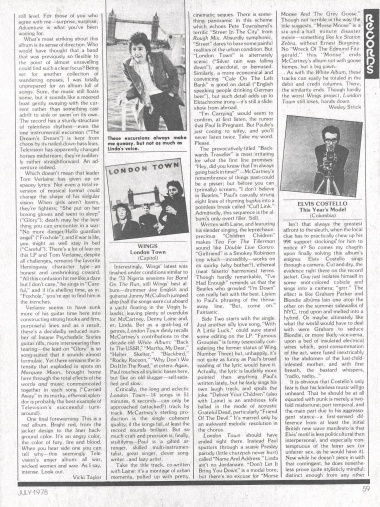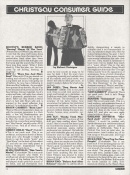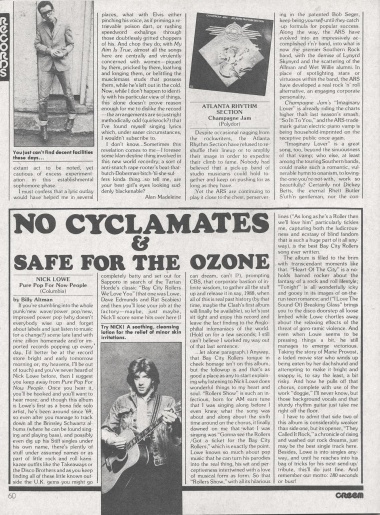Creem, July 1978: Difference between revisions
(link Alan Madeleine) |
|||
| (12 intermediate revisions by the same user not shown) | |||
| Line 1: | Line 1: | ||
{{Bibliography header}} | {{Bibliography header}} | ||
{{Bibliography index}} | {{:Bibliography index}} | ||
{{Creem index}} | {{:Creem index}} | ||
{{ | {{:US rock magazines index}} | ||
{{Bibliography article header}} | {{Bibliography article header}} | ||
<center><h3>This Year's Model</h3></center> | <center><h3> This Year's Model </h3></center> | ||
''' | <center>''' Elvis Costello </center> | ||
---- | ---- | ||
<center>Alan Madeleine</center> | <center> Alan Madeleine </center> | ||
---- | ---- | ||
{{Bibliography text}} | {{Bibliography text}} | ||
Isn't that always the greatest affront to the sleuth, when the focal clue has to practically chew up his 99-cent support stockings for him to notice it? So comes my chagrin upon finally solving this album's enigma: Elvis Costello sings through a camera. Cut and dry, the evidence right there on the record jacket. Guy just isolates himself in some snot-colored cubicle and sings into a camera; "grrr." The effect is like Graham Parker and Blondie albums lain one atop the other on the summer sidewalks of NYC, trod upon and melted into a hybrid. Or maybe ultimately like what the world would have to deal with were Graham to seduce Blondie, or more likely vice-versa, upon a bed of insulated electrical wires which, post-consummation of the act, were fused inextricably to the abdomen of the lust-child-infested mother, and with first breath, the bastard whispers, "radio, radio..." | Isn't that always the greatest affront to the sleuth, when the focal clue has to practically chew up his 99-cent support stockings for him to notice it? So comes my chagrin upon finally solving this album's enigma: Elvis Costello sings through a camera. Cut and dry, the evidence right there on the record jacket. Guy just isolates himself in some snot-colored cubicle and sings into a camera; "grrr." The effect is like Graham Parker and Blondie albums lain one atop the other on the summer sidewalks of NYC, trod upon and melted into a hybrid. Or maybe ultimately like what the world would have to deal with were Graham to seduce Blondie, or more likely vice-versa, upon a bed of insulated electrical wires which, post-consummation of the act, were fused inextricably to the abdomen of the lust-child-infested mother, and with first breath, the bastard whispers, ''"radio, radio..."'' | ||
It is obvious that Costello's only fear is that his fearless music will go unheard. That he should be at all equated with punk is merely a two-fold misfortune; part temporal, and the main part due to his aggressogant | It is obvious that Costello's only fear is that his fearless music will go unheard. That he should be at all equated with punk is merely a two-fold misfortune; part temporal, and the main part due to his aggressogant stance — a first-sensed difference from at least the initial British new wave manifesto is that Elvis' motif is less politicultural than interpersonal, and especially contemptuous of the fairer sex (or unfairer sex, as he would have it). Now while he doesn't piece in with that contingent, he does nonetheless prove quite stylisticly mindful; distinct enough from any other extant act to be noted, yet cautious of excess experimentation in this establishmental sophomore phase. | ||
I must confess that a lyric outlay would have helped me in several places, what with Elvis either pinching his voice, as if priming a retrievable poison dart, or rushing speedword exhalings through those doubtlessly gritted choppers of his. And chop they do; with ''My Aim Is True'', almost all the songs here are centrally and virulently concerned with | I must confess that a lyric outlay would have helped me in several places, what with Elvis either pinching his voice, as if priming a retrievable poison dart, or rushing speedword exhalings through those doubtlessly gritted choppers of his. And chop they do; with ''My Aim Is True'', almost all the songs here are centrally and virulently concerned with women — piqued by them, pricked by them, loathing and longing them, or belittling the musclemass studs that possess them, while he's left out in the cold. Now, while I don't happen to identify with his particular view of things, this alone doesn't prove reason enough for me to dislike the record — the arrangements are so justright methodically odd (quirkrock?) that I've found myself singing lyrics which, under saner circumstances, I wouldn't subscribe to. | ||
I don't know.. .Sometimes this revelation comes to | I don't know... Sometimes this revelation comes to me — I foresee some klan-destine thing involved in this new world recordry; a sort of anti-snatch rape-rooter's beat-that-butch-Doberman-bitch-'til-she-suffers kinda thing... so tell me, are your best girl's eyes looking suddenly blackenable? | ||
{{cx}} | {{cx}} | ||
{| cellspacing="0" | |||
|- valign="top" | |||
|style="border: 6px solid #e5e5e5; padding: .1em 1em 1em; background-color: #F8F8F8"| | |||
<center><h3> No cyclamates and safe for the ozone </h3></center> | |||
---- | |||
<center> Billy Altman </center> | |||
---- | |||
'''Nick Lowe <br> | |||
Pure Pop For Now People | |||
{{Bibliography text}} | |||
If you're stumbling into the whole punk/new wave/power pop/new, improved power pop (why doesn't everybody wise up and forget about labels and just listen to music for a change?) scene late (and with nine zillion homemade and/or imported records popping up every day, I'd better be at the record store bright and early tomorrow morning or, my heavens, I'll be out of touch) and you've never heard of Nick Lowe before, then I suggest you keep away from ''Pure Pop For Now People''. Once you hear it, you'll be hooked and you'll want to hear more; and though this album is Lowe's first as a bona fide solo artist, he's been around since '69, so even after you manage to track down all the Brinsley Schwarz albums (where he can be found singing and playing bass), and possibly even dig up his Stiff singles under his own name, there's plenty of stuff under assumed' names or as part of little rock and roll kamikazee outfits like the Takeaways or the Disco Brothers and as you keep finding all of these little known outside the U.K. gems you might go completely batty and set out for Sapporo in search of the Tartan Horde's classic "Bay City Rollers We Love You" (that one was Lowe, Dave Edmunds and Rat Scabies) and then you'll lose your job at the factory — maybe, just maybe, Nick'll score some hits over here (I can dream, can't I?), prompting CBS, that corporate bastion of infinite wisdom, to gather all the stuff up and release it in say, 1988, when all of this is real past history (by that time, maybe the Clash's first album will finally be available), so let's just sit tight and enjoy this record and leave the fact finding to the Anglophilial infomaniacs of the world. (Hold on for a few seconds; I still can't believe I worked my way out of that last sentence. | |||
...let alone paragraph.) Anyway, that Bay City Rollers tongue in cheek homage isn't on this album, but the followup is and that's as good a place as any to start explaining why listening to Nick Lowe does wonderful things to my heart and soul. "Rollers Show" is such an infectious, born for AM ears tune that I was singing along before I even knew, what the song was about and along about the sixth time around on the chorus, it finally dawned on me that what I was singing was ''"Gonna see the Rollers /Got a ticket for the Bay City Rollers,"'' which is exactly the point. Lowe knows so much about pop music that he can turn his parodies into the real thing, his wit and perceptiveness intertwined with a love of musical form as form. So that "Rollers Show," with all its hilarious lines ("As long as he's a Roller then we'll love him" particularly tickles me, capturing both the ludicrousness and ecstasy of blind fandom that is such a huge part of it all anyway), ''is'' the best Bay City Rollers song ever written. | |||
The album is filled to the brim with transcendant moments like that. "Heart Of The City" is a no-holds barred rocker about the fantasy of a rock and roll lifestyle; "Tonight" is all wonderfully icky and gooey in its images of on-the-run teen romance; and ("I Love The Sound Of) Breaking Glass" brings you to the disco doorstep all loose limbed while Lowe chortles away about the relaxing effects of the threat of goro-ramic violence. And even when Lowe seems to be pressing things a bit, he still manages to emerge victorious. Taking the story of Marie Provost, a faded movie star who winds up being eaten by her dachshund and attempting to make it bright and snappy is, to say the least, a bit risky. And how he pulls off that chorus, complete with use of the work "doggie," Ill never know, but those background vocals and that sturdy rhythm guitar just take me right off the floor. | |||
I have to admit that side two of this album is considerably weaker than side one, but its opener, "They Called It Rock," a chronicle of rising and washed out rock dreams, just may be the best single track here. Besides, Lowe is into singles anyway, and until he reaches into his bag of tricks for his next send-up/tribute, this'll do just fine. And remember our motto: ''180 seconds or bust!'' | |||
<!-- Try NICK! A soothing, cleansing lotion for the relief of minor skin irritations. --> | |||
{{cx}} | |||
{{cx}} | |||
{{Bibliography notes header}} | {{Bibliography notes header}} | ||
{{Bibliography notes}} | {{Bibliography notes}} | ||
{{Bibliography next | |||
|prev = Creem, May 1978 | |||
|next = Creem, August 1978 | |||
}} | |||
'''Creem, July 1978 | '''Creem, July 1978 | ||
---- | ---- | ||
[[Alan Madeleine]] | [[Alan Madeleine]] reviews ''[[This Year's Model]]''. | ||
---- | |||
[[Robert Christgau]] reviews ''This Year's Model''. {{t}} <span style="font-size:92%">(Same as ''[[Village Voice, April 24, 1978|Village Voice]]''.)</span> | |||
---- | |||
[[Billy Altman]] reviews [[Nick Lowe]]'s ''[[Pure Pop For Now People]]''. | |||
{{Bibliography images}} | {{Bibliography images}} | ||
[[image:1978-07-00 Creem page 59.jpg|380px]] | |||
[[image:1978-07-00 Creem page | <br><small>Page scan.</small> | ||
<br> | |||
{{Bibliography box}} | |||
<center><h3> This Year's Model </h3></center> | |||
<center>''' Elvis Costello </center> | |||
<center><h3>This Year's Model</h3></center> | |||
''' | |||
---- | ---- | ||
<center>Robert Christgau </center> | <center> Robert Christgau </center> | ||
---- | ---- | ||
{{Bibliography text}} | {{Bibliography text}} | ||
[[image:1978-07-00 Creem page 14.jpg|130px|border|right]] | |||
This is not punk rock. But anyone who thinks it's uninfluenced should compare the bite and drive of the backup here to the well-played studio pub-rock sound of his debut, and ask themselves how come he now sounds as angry as he says he feels. I find his snarl more compelling musically and verbally than all his melodic and lyrical tricks, and while I still wish he liked girls more, at least I'm ready to believe he's had some bad luck. | This is not punk rock. But anyone who thinks it's uninfluenced should compare the bite and drive of the backup here to the well-played studio pub-rock sound of his debut, and ask themselves how come he now sounds as angry as he says he feels. I find his snarl more compelling musically and verbally than all his melodic and lyrical tricks, and while I still wish he liked girls more, at least I'm ready to believe he's had some bad luck. | ||
{{cx}} | {{cx}} | ||
{{cx}} | {{cx}} | ||
<br><br> | |||
[[image:1978-07-00 Creem page 60.jpg|380px]] | |||
<br><small>Page scan.</small> | |||
<small>Cover and page scan.</small><br> | |||
[[image:1978-07-00 Creem cover.jpg|x120px|border]] | |||
[[image:1978-07-00 Creem page 19.jpg|x120px|border]] | |||
{{Bibliography notes footer}} | {{Bibliography notes footer}} | ||
| Line 58: | Line 94: | ||
==External links== | ==External links== | ||
*[http://en.wikipedia.org/wiki/Creem Wikipedia: Creem] | *[http://en.wikipedia.org/wiki/Creem Wikipedia: Creem] | ||
*[https://www.robertchristgau.com/get_album.php?id=1153 RobertChristgau.com] | |||
{{DEFAULTSORT:Creem 1978-07-00}} | |||
[[Category:Bibliography 1978 | [[Category:Bibliography]] | ||
[[Category:Bibliography 1978]] | |||
[[Category:Creem| Creem 1978-07-00]] | [[Category:Creem| Creem 1978-07-00]] | ||
[[Category:Magazine articles | [[Category:Magazine articles]] | ||
[[Category:Album reviews | [[Category:Album reviews]] | ||
[[Category: | [[Category:Pure Pop For Now People reviews]] | ||
Latest revision as of 20:49, 26 April 2023
|




